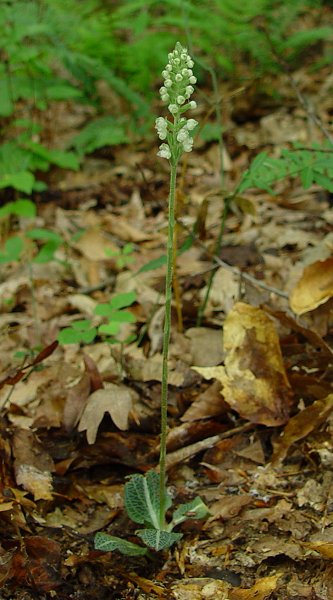Goodyera pubescens (Willd.) R. Br.
Downy Rattlesnake Plantain

Native
CC = 10
CW = 3
MOC = 12
© DETenaglia
Goodyera pubescens (Willd.) R. Br.Downy Rattlesnake Plantain | |
 |
Native CC = 10 CW = 3 MOC = 12 |
© DETenaglia |
|
Family - Orchidaceae Habit - Perennial forb with branched rhizomes. Stems - Flowering stems 15-40 cm long, densely glandular-hairy.
Leaves - Basal, 4-10, 3-8 cm long, oblong-elliptic, tapering abruptly to short, winged petioles, dark green with white midribs and veins, herbaceous, glabrous.
Inflorescences - Dense terminal spikes with 20-50 flowers. Flowering stem with reduced, triangular bracts.
Flowers - Sepals 4-5 mm long, ovate, concave, white with a green midvein and tip. Lateral petals 4-6 mm long, oblong-spathulate, white, arching over the upper sepal. Lip 3-4 mm long, strongly expanded into a 2-lobed pouch, the tip with a blunt, reflexed margin, white, the outer surface with minute tubercles. Column 2 mm long, white. Stamen 1, staminodes absent.
Fruits - Capsules, ascending, 4-10 mm long, globose to broadly elliptic in outline, strongly ribbed.
Flowering - July - September. Habitat - Coniferous woods with acidic soils, ravines, often associated with Pinus echinata. Origin - Native to the U.S. Other info. - This is one of the few species whose leaves may perhaps be more showy than the flowers. The appearance of the basal rosettes, with their intricate pattern of light-colored venation, is sufficient to identify the plant. It is uncommon in Missouri, found in only a handful of eastern Ozark counties. The plant is much more common in eastern and northeastern states, also ranging into the upper Midwest. In many of those areas it is one of the most commonly encountered orchids. It is strongly associated with the habitat types described above. Photographs taken in Brown Summit, NC., 6-16-02 (DETenaglia); also at Pickle Springs Natural Area, Ste. Genevieve County, MO, 10-1-2011, and Hickory Canyons Natural Area, Ste. Genevieve County, MO, 8-30-2017 (SRTurner). |